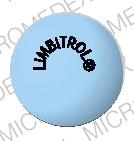Limbitrol and Alcohol/Food Interactions
There are 2 alcohol/food/lifestyle interactions with Limbitrol (amitriptyline / chlordiazepoxide).
Chlordiazepoxide Food/Lifestyle
Moderate Food Interaction
Consumer information for this interaction is not currently available.
GENERALLY AVOID: Alcohol may potentiate some of the pharmacologic effects of CNS-active agents. Use in combination may result in additive central nervous system depression and/or impairment of judgment, thinking, and psychomotor skills.
MANAGEMENT: Patients receiving CNS-active agents should be warned of this interaction and advised to avoid or limit consumption of alcohol. Ambulatory patients should be counseled to avoid hazardous activities requiring complete mental alertness and motor coordination until they know how these agents affect them, and to notify their physician if they experience excessive or prolonged CNS effects that interfere with their normal activities.
Switch to professional interaction data
Chlordiazepoxide Obesity
Moderate Potential Hazard, Moderate plausibility
benzodiazepines - obesity
The plasma half-lives of benzodiazepines may be prolonged in obese patients, presumably due to increased distribution into fat. Marked increases in distribution (> 100%) have been reported for diazepam and midazolam, and moderate increases (25% to 100%) for alprazolam, lorazepam, and oxazepam. Therapy with benzodiazepines should be administered cautiously in obese patients, with careful monitoring of CNS status. Longer dosing intervals may be appropriate. When dosing by weight, loading doses should be based on actual body weight, while maintenance dose should be based on ideal body weight to avoid toxicity.
Switch to professional interaction data
Limbitrol drug interactions
There are 776 drug interactions with Limbitrol (amitriptyline / chlordiazepoxide).
Limbitrol disease interactions
There are 31 disease interactions with Limbitrol (amitriptyline / chlordiazepoxide) which include:
- acute alcohol intoxication
- closed-angle glaucoma
- drug dependence
- renal/liver disease
- respiratory depression
- seizures
- prolonged hypotension
- anticholinergic effects
- cardiovascular disease
- pheochromocytoma
- acute myocardial infarction recovery
- cardiovascular disease
- seizure disorders
- depression
- obesity
- paradoxical reactions
- porphyria
- bone marrow suppression
- diabetes
- renal/liver disease
- schizophrenia/bipolar disorder
- tardive dyskinesia
- acute alcohol intoxication
- bipolar disorder screening
- glaucoma
- hyper/hypoglycemia
- liver/renal disease
- neutropenia
- schizophrenia
- thyroid disorders
- urinary retention
More about Limbitrol (amitriptyline / chlordiazepoxide)
- Limbitrol consumer information
- Check interactions
- Compare alternatives
- Reviews (3)
- Drug images
- Side effects
- Dosage information
- During pregnancy
- Drug class: psychotherapeutic combinations
Related treatment guides
Drug Interaction Classification
| Highly clinically significant. Avoid combinations; the risk of the interaction outweighs the benefit. | |
| Moderately clinically significant. Usually avoid combinations; use it only under special circumstances. | |
| Minimally clinically significant. Minimize risk; assess risk and consider an alternative drug, take steps to circumvent the interaction risk and/or institute a monitoring plan. | |
| No interaction information available. |
See also:
Further information
Always consult your healthcare provider to ensure the information displayed on this page applies to your personal circumstances.


